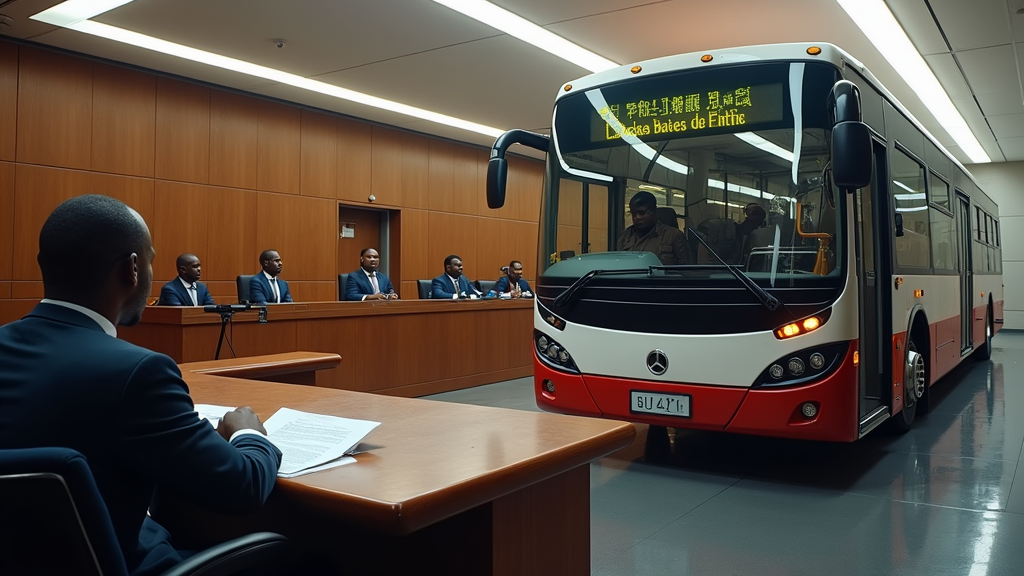Senate President Godswill Akpabio finds himself at the center of a controversial legal battle following allegations of sexual harassment that have escalated into a high-stakes lawsuit. His wife, Unoma Godswill Akpabio, has filed a claim against Senator Natasha Akpoti-Uduaghan, accusing her of defamation and seeking a staggering N250 billion in damages. The lawsuit highlights the complexities surrounding fundamental rights, as Mrs. Akpabio argues that Natasha’s statements have unjustly harmed her family’s reputation. With accusations of victimization and emotional distress at the forefront, this case has captured national attention and raised questions about the conduct of public officials. As the legal proceedings unfold, the implications of this defamation case extend far beyond the Senate floor, potentially reshaping the narrative around power dynamics within Nigerian politics.
In the realm of Nigerian politics, the unfolding drama surrounding Senate President Godswill Akpabio and his wife, Unoma, highlights a significant legal confrontation involving Senator Natasha Akpoti-Uduaghan. This case revolves around serious allegations of misconduct and has sparked discussions about the boundaries of personal and professional conduct among lawmakers. The legal claims, including a substantial demand for N250 billion in damages, emphasize the importance of safeguarding fundamental rights in the face of public scrutiny. As both parties navigate their respective positions, the defamation lawsuit reflects broader societal issues pertaining to reputation and accountability in governance. This situation underscores the necessity for clarity and integrity in legislative environments, as the implications of these allegations could reverberate across the political landscape.
Senate President Akpabio Faces Allegations of Sexual Advances
Senate President Godswill Akpabio has found himself at the center of a controversial legal battle following accusations made by Senator Natasha Akpoti-Uduaghan. The allegations assert that Akpabio made inappropriate sexual advances towards Akpoti-Uduaghan, which led to claims of victimization after she rejected these advances. Such serious allegations not only tarnish Akpabio’s reputation but also bring to light the broader issues of sexual harassment in the political arena, which have been increasingly scrutinized in recent years. This situation highlights the urgent need for lawmakers to address sexual harassment policies within their institutions.
The impact of these allegations extends beyond personal reputations; they also reflect on the Senate’s culture and the treatment of women in politics. Akpabio’s leadership role in the Senate adds an additional layer of complexity to the situation, as it raises questions about how power dynamics can influence interactions between male and female senators. The ongoing legal proceedings initiated by Mrs. Unoma Godswill Akpabio against Natasha Akpoti-Uduaghan underscore the serious nature of these claims and the necessity for accountability in cases of alleged sexual misconduct.
Legal Action: N250 Billion Damages Sought by Mrs. Akpabio
In a bold move, Mrs. Unoma Godswill Akpabio has filed a lawsuit seeking a staggering N250 billion in damages from Senator Natasha Akpoti-Uduaghan. This legal action is not just about financial compensation; it is a stand for her fundamental rights, as she claims that the allegations made by Akpoti-Uduaghan have caused irreparable harm to her family’s reputation. The lawsuit highlights the serious implications of defamation and the potential for emotional distress that can arise from such public accusations. Mrs. Akpabio’s claim is rooted in the assertion that her rights, as outlined in the 1999 Constitution and the African Charter on Human and Peoples’ Rights, have been violated.
Additionally, the lawsuit seeks to establish a precedent in how defamation cases are handled within the political sphere. The demand for a perpetual injunction against Akpoti-Uduaghan to prevent further statements reflects the deep concern over the impact of public discourse on personal lives, particularly in high-stakes political environments. By pursuing this legal route, Mrs. Akpabio aims to protect not only her own reputation but also that of her children, emphasizing the far-reaching effects of political scandals.
Accusations of Defamation: A Battle for Reputation
The defamation lawsuit filed by Mrs. Akpabio is a crucial aspect of this ongoing legal battle, as it seeks to address the consequences of public statements made by Senator Natasha Akpoti-Uduaghan. In her claims, Mrs. Akpabio argues that Akpoti-Uduaghan’s accusations have not only damaged her personal reputation but have also harmed her family’s standing in society. This case underscores the importance of responsible communication, particularly for public figures whose words can have significant repercussions. The request for a formal retraction and an apology demonstrates the seriousness with which she views the allegations and their fallout.
Moreover, the legal proceedings highlight the broader implications of defamation in the political landscape. As both parties prepare for a contentious court battle, the outcome may set important precedents regarding how allegations of sexual harassment and defamation are addressed within the political domain. The public and media scrutiny surrounding this case further complicates the situation, as both women navigate their reputations amidst intense public interest and opinion.
Fundamental Rights and the Legal Framework
The legal framework surrounding fundamental rights in Nigeria provides the basis for Mrs. Akpabio’s lawsuit against Natasha Akpoti-Uduaghan. Citing Section 34 of the 1999 Constitution, which protects individuals from degrading treatment and ensures the right to dignity, Mrs. Akpabio’s legal team is positioning her case as a fundamental rights issue. This legal approach is significant, as it not only seeks to protect her personal dignity but also aims to challenge the broader societal norms that allow for victimization of women in political spaces.
By invoking the African Charter on Human and Peoples’ Rights, Mrs. Akpabio is tapping into international legal standards that prioritize human rights. This alignment with global norms enhances her case’s validity and emphasizes the importance of safeguarding individual rights against defamation and harassment. The proceedings will likely explore the intersection of personal rights and public life, raising critical questions about the responsibilities of public figures and the legal protections available to them.
The Role of Media in Shaping Public Perception
Media plays a crucial role in shaping public perception regarding the ongoing legal battle between Mrs. Akpabio and Senator Akpoti-Uduaghan. As the case unfolds, various media outlets have provided extensive coverage, influencing how the public views the allegations and the individuals involved. The portrayal of Mrs. Akpabio as a victim of defamation and her husband’s alleged misconduct can sway public opinion and impact the legal proceedings. This highlights the media’s power in framing narratives that can either support or undermine the reputations of those in the public eye.
Additionally, the media’s role in amplifying the voices of both parties underscores the importance of responsible journalism. As sensationalism can lead to misinformation, it becomes crucial for reporters to provide balanced coverage that respects the legal process while informing the public. The ongoing media scrutiny will undoubtedly continue to shape the discourse surrounding this case, as both sides work to present their narratives and defend their reputations in the court of public opinion.
Implications for Women in Politics
The allegations against Senate President Akpabio and the subsequent legal actions taken by Mrs. Akpabio and Senator Natasha Akpoti-Uduaghan serve as a critical reflection on the treatment of women in politics. This case shines a light on the challenges female politicians face, including the threat of sexual harassment and the potential for defamation when they resist advances. The implications of this situation extend beyond the individuals involved, as it highlights the need for systemic changes to protect women in political environments and ensure their voices are heard.
Furthermore, the public discussions surrounding this case may inspire more women to speak out against harassment and advocate for their rights. As the legal battle unfolds, it presents an opportunity to address the cultural and institutional barriers that often silence women in politics. By bringing these issues to the forefront, the case could potentially lead to greater awareness and reform regarding sexual harassment policies and support systems for women in leadership roles.
The Legal Landscape of Sexual Harassment Cases
The ongoing legal proceedings between Mrs. Akpabio and Senator Akpoti-Uduaghan highlight the complexities of navigating sexual harassment cases within the legal framework. The lawsuits filed by Mrs. Akpabio not only focus on defamation but also on fundamental rights, showcasing the multifaceted nature of such cases. The outcome of this legal battle may set important precedents for how sexual harassment allegations are treated in the future, both in terms of legal recourse and public perception.
In addition, this case underscores the need for comprehensive legal protections against sexual harassment in Nigeria. As discussions around the case continue, it may encourage lawmakers to review and strengthen existing laws to ensure they adequately address the issue of sexual harassment in the workplace, particularly in political settings. The legal landscape is evolving, and high-profile cases like this are essential in raising awareness and prompting action towards creating safer environments for all individuals.
The Public Response: Support and Backlash
Public reaction to the allegations and lawsuits has been mixed, with both support and backlash directed toward the key figures involved. Many individuals and organizations advocate for Mrs. Akpabio, viewing her legal actions as a necessary step in addressing issues of sexual harassment and defamation in politics. This support reflects a growing movement to empower women and hold powerful individuals accountable for their actions. The case resonates with those who have faced similar experiences, highlighting the importance of solidarity among women in challenging oppressive structures.
Conversely, there is also significant backlash against both parties, as some public figures and commentators question the motives behind the allegations and legal actions. This polarized response underscores the complexities of navigating public opinion in cases involving sexual harassment and defamation. As the legal proceedings progress, the public’s reaction will likely evolve, influenced by the outcomes in court and the narratives presented by both sides.
Future Implications for Political Accountability
The legal conflict between Mrs. Akpabio and Senator Akpoti-Uduaghan carries significant implications for political accountability in Nigeria. As the case unfolds, it raises important questions about how allegations of sexual misconduct are handled within political institutions and the broader societal norms that govern such behaviors. This situation could catalyze a reevaluation of the mechanisms in place for addressing sexual harassment and ensuring accountability among politicians, potentially leading to reforms that prioritize transparency and justice.
Ultimately, the outcomes of these legal proceedings may influence future cases and set a precedent for how similar allegations are treated in the political arena. If Mrs. Akpabio’s claims are substantiated, it could empower other victims of sexual harassment to come forward and seek justice. Conversely, a ruling in favor of Akpoti-Uduaghan may raise concerns about the validity of women’s claims in political contexts. Regardless of the outcome, this case is poised to impact the ongoing discourse around sexual harassment and accountability in Nigerian politics.
Frequently Asked Questions
What allegations are made against Senate President Akpabio regarding sexual harassment?
Senate President Godswill Akpabio has been accused of making sexual advances towards Senator Natasha Akpoti-Uduaghan. Following her rejection of these advances, Akpoti-Uduaghan claims that she has faced victimization in the Senate. These allegations have led to legal actions initiated by Mrs. Unoma Godswill Akpabio against Natasha.
How much damages is Mrs. Akpabio seeking in her lawsuit against Senator Natasha Akpoti-Uduaghan?
Mrs. Unoma Godswill Akpabio is seeking N250 billion in damages in her lawsuit against Senator Natasha Akpoti-Uduaghan. This amount is claimed under allegations of defamation and violations of her fundamental rights.
What legal grounds are cited in Mrs. Akpabio’s lawsuit against Senator Natasha?
Mrs. Akpabio’s lawsuit against Senator Natasha Akpoti-Uduaghan cites violations of her fundamental rights as outlined in Section 34(1)(a) of the 1999 Constitution and Articles 4 and 5 of the African Charter on Human and Peoples’ Rights. She seeks to address the emotional distress caused by Natasha’s public statements.
What statement did Senator Natasha Akpoti-Uduaghan make regarding Senate President Akpabio?
Senator Natasha Akpoti-Uduaghan claimed that she is being punished by Senate President Godswill Akpabio for rejecting his sexual advances. This statement has been a pivotal point in her public accusations and subsequent legal confrontations.
What are the main claims made by Mrs. Akpabio in her defamation case against Natasha?
In her defamation case, Mrs. Unoma Godswill Akpabio asserts that Natasha Akpoti-Uduaghan’s statements on national television have harmed her family’s reputation. She seeks a formal retraction and an unconditional apology from Natasha, along with financial compensation for the damages caused.
What measures is Mrs. Akpabio seeking to prevent further statements by Senator Natasha?
Mrs. Akpabio is requesting a perpetual injunction to prevent Senator Natasha Akpoti-Uduaghan from making any further statements that she deems inciteful and damaging. This legal action aims to protect her family’s reputation and emotional wellbeing.
What has been the public and media response to the allegations against Senate President Akpabio?
The allegations against Senate President Godswill Akpabio have garnered significant media attention, leading to intense exchanges in the Senate. Both parties involved, Mrs. Akpabio and Senator Natasha, remain firm in their claims, creating a highly publicized legal battle that continues to unfold.
| Key Point | Details |
|---|---|
| Legal Action Initiated | Mrs. Unoma Godswill Akpabio has filed lawsuits against Senator Natasha Akpoti-Uduaghan for N250 billion over alleged defamation and violation of fundamental rights. |
| Allegations of Sexual Harassment | Senator Natasha claims she faced victimization from Senate President Akpabio after rejecting his sexual advances. |
| Response from Mrs. Akpabio | Mrs. Akpabio denies the allegations made by Natasha, labeling them as lies for personal gain. |
| Legal Grounds of the Suit | The lawsuit was filed under Section 34(1)(a) of the 1999 Constitution and the African Charter on Human and Peoples’ Rights. |
| Injunction and Damages Requested | Mrs. Akpabio seeks a court order to prevent further defamatory statements and N250 billion in damages. |
| Defamation Claim | Mrs. Akpabio’s separate lawsuit seeks damages for Natasha’s televised statements that allegedly harmed her family’s reputation. |
Summary
Senate President Akpabio is facing a significant legal challenge as his wife takes action against Senator Natasha Akpoti-Uduaghan for alleged defamation and violation of fundamental rights. This high-profile case, marked by serious allegations, highlights the contentious atmosphere within the Senate and the personal ramifications of political disputes. As the situation develops, it underscores the complexities of accountability and the implications of public statements made by politicians in their professional conduct.



